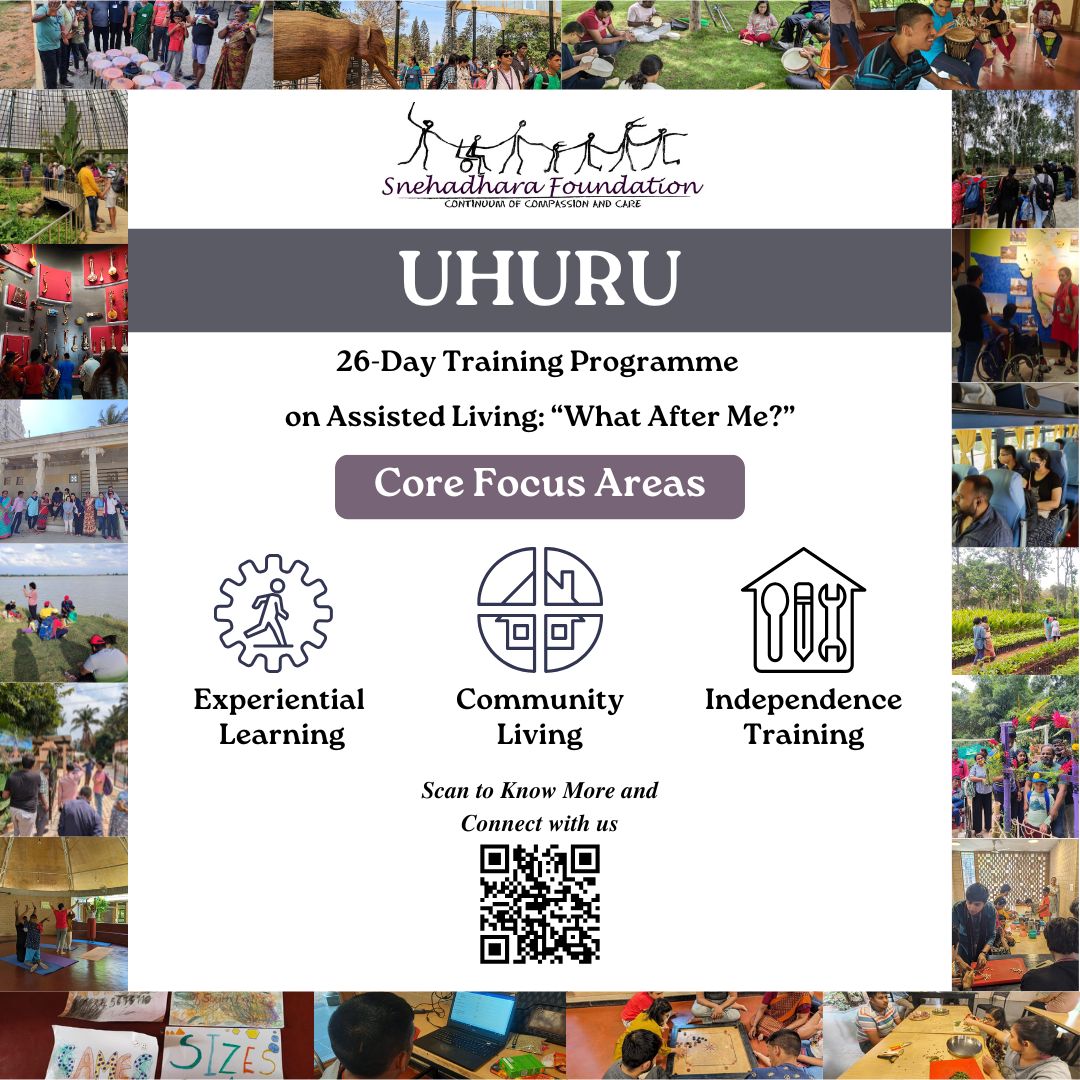In a world where independence is often taken for granted, the reality for neurodiverse adults navigating adulthood is starkly different. Simple acts like grocery shopping, managing finances, or even forming social connections can become daunting challenges. Society, with its minimal readiness and systemic gaps, often leaves neurodiverse individuals and their families to fend for themselves, creating an urgent need to rethink and restructure our approach to assisted living.
This is not merely about creating a program, it is about sustaining an idea, a movement towards inclusion, dignity, and agency for neurodiverse adults. I invite all of you to join me in this quest. At Snehadhara, we believe this is a call for every stakeholder: organizations, families, corporations, and communities to come together as co-travelers, each offering their unique strengths to this collective journey.
Why This Needs to Be Done
For neurodiverse individuals, adulthood comes with its own set of fears and uncertainties. For families, the quest for the “best solution” is often marked by exhaustion and a lingering question: Is there one at all? The truth is, no one-size-fits-all model exists. Each framework for assisted living emerges from lived experiences, shaped by real-time fears, aspirations, and the relentless effort of families and organizations.
Yet, there is a universal truth—there is a dearth of services. The few that exist are often inaccessible, unaffordable, or unsustainable. It is not enough to create isolated programs; we must build a society that recognizes the value of these efforts and actively contributes to their growth.
Parents and Communities: Partners in the Quest
For parents and caregivers, the journey is deeply personal, driven by hope and fear in equal measure. Communities and organizations must walk this path with them, recognizing that the insights of families are invaluable. Co-creating solutions with parents ensures that programs are grounded in reality, addressing both immediate needs and long-term aspirations.
But we must also ask ourselves: Are we building a system that allows families to dream beyond survival? Are we offering them a future where neurodiverse adults are seen not just as dependents but as contributors to society? The answer lies in how we, as a collective, choose to act today.
Building an Alliance: Co-Travelers on the Same Path
What would it mean for organizations to come together, not as competitors but as collaborators? Each organization brings unique expertise : be it therapeutic services, skill-building programs, or community integration initiatives. Together, these strengths can form a robust ecosystem of support for neurodiverse adults.
An alliance would allow us to learn from each other, pool resources, create diverse opportunities ensuring enough access to environments that match abilities and aspirations for the adult.
Sustaining the Idea, Not Just the Program
Every cohort of neurodiverse adults represents an opportunity—not just to serve, but to innovate. Programs must evolve to address the changing needs of participants and the insights gained from working with them. Sustainability here doesn’t just mean financial viability; it means creating frameworks that endure, adapt, and inspire others to replicate and build upon them.
This requires a paradigm shift in how we approach program design:
- Integrated Budgets: Organizations must allocate funds specifically for long-term assisted living services, ensuring continuity and growth.
- Therapeutic Support: Programs should prioritize mental health, emotional well-being, and skills for independent living, recognizing their fundamental role in creating empowered individuals.
- Corporate Partnerships: Businesses have a crucial role to play. Through funding, volunteering, or even creating inclusive workplace opportunities, corporations can contribute meaningfully to this mission.
A Call to Action
Call for Action
This is not just about teaching skills or creating housing. It is about redefining what inclusion and independence mean. It is about creating a network of organizations, parents, and allies who believe in the potential of every individual, no matter how diverse their needs may be.
Let us come together to build an ecosystem where adults can thrive with dignity, families feel supported rather than isolated, organizations collaborate to address gaps, and corporations actively foster inclusion.
This journey demands courage, innovation, and relentless hope. It asks us to see the value in every small step, every shared resource, and every new opportunity we create for neurodiverse adults. Together, we can ensure that this idea, this vision of a truly inclusive society does not just sustain but flourishes, inspiring generations to come.
Are we ready to take this leap together? What is your stand in this collective journey? The question, “What after me?” is no longer just a parent’s worry—it is a call for action, a call for all of us to come together and respond. The time is now. At Snehadhara, we believe that assisted living is not just a necessity but a skill that needs to be taught, nurtured, and prioritized. This is a collective effort, and we cannot do this without you. Each of you has the power to contribute—through your voice, your resources, your time, or your expertise. The need is urgent, and the opportunity to make a difference is now.
If this resonates with you, if this calls out to you, please connect with me. Let’s come together to create a world where families feel supported, and society truly reflects the values of inclusion and collaboration. Let’s act now because together, we can make this vision a reality.

